|
|
|
Sort Order |
|
|
|
Items / Page
|
|
|
|
|
|
|
| Srl | Item |
| 1 |
|
| 2 |
ID:
173171
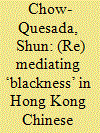

|
|
|
|
|
| Summary/Abstract |
This paper studies the representations of Africans and African cultures in Hong Kong media and the political, social, and cultural significance in shaping the socioeconomic wellbeing of Africans in the city. With the rising population of Africans in Hong Kong and the evolving nature of Africa-China relations, Africa and its cultures have become more prominent across Hong Kong’s media. Representations of the African continent in Chinese medium newspapers in the city help define the local understanding of African peoples and cultures. By analysing the construction of “African-ness” in these representations, this article shows that African cultures are constantly portrayed in relation to those of Hong Kong. It is by studying the absences and presences of “African-ness” that it can be shown that Africa is often narrated as the subordinate of the local. Significantly, this hierarchical system not only predetermines but also crystalizes the local understanding of Africa.
|
|
|
|
|
|
|
|
|
|
|
|
|
|
|
|
| 3 |
ID:
016334
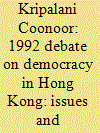

|
|
|
|
|
| Publication |
April-June 1993.
|
| Description |
165-176
|
|
|
|
|
|
|
|
|
|
|
|
|
|
|
|
| 4 |
ID:
058408
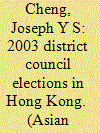

|
|
|
|
|
| Publication |
Sep-Oct 2004.
|
|
|
|
|
|
|
|
|
|
|
|
|
|
|
|
| 5 |
ID:
185498
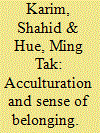

|
|
|
|
|
| Summary/Abstract |
The question of a sense of belonging to a host society is paramount to the study of acculturation in the society of settlement. The study of acculturation seeks to examine how acculturating people make sense of belonging to both their country of origin and the receiving community, and the potential consequences of adaptation. Using Berry’s acculturation typology as an analytical framework, this article examines the sense of belonging among a group of Pakistani secondary school students and compares their accounts of social identification with everyday sociocultural practices in Hong Kong. A phenomenographic analysis of the participants’ interviews reveals a lack of congruence between their sense of belonging and their lived acculturative experience. The findings suggest that categorising acculturating people based merely on their sense of belonging offers a limited understanding of acculturation. The theoretical and research implications of the findings are also discussed.
|
|
|
|
|
|
|
|
|
|
|
|
|
|
|
|
| 6 |
ID:
138017
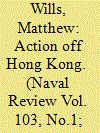

|
|
|
| 7 |
ID:
188953
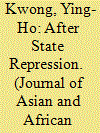

|
|
|
|
|
| Summary/Abstract |
The Chinese government has imposed the National Security Law which has resulted in Hong Kong formally entering into a phase of movement abeyance. By analysing 3377 posts on LIHKG Internet forum, this article re-explores the online protest attitude during this movement abeyance. The findings indicate that content creators are more attentive in regard to criticizing the legislation and pro-Beijing figures, followed by seeking international support and calling for unity. Users are more ‘participative’ in calling for mutual destruction between the authorities and people, initiating mutual support and seeking emigration. This study provides new perspectives on the study of movement abeyance.
|
|
|
|
|
|
|
|
|
|
|
|
|
|
|
|
| 8 |
ID:
131217
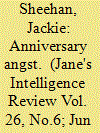

|
|
|
| 9 |
ID:
096832
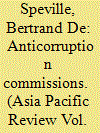

|
|
|
| 10 |
ID:
143439
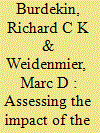

|
|
|
|
|
| Summary/Abstract |
The November 2008 Chinese stimulus package seemed to provide almost ideal preconditions for governmental success based upon its size, its concentration on infrastructure, accompanying fiscal expansion at the local level, and supportive expansions in bank lending rates. Our sectoral-level analysis suggests that investor reactions were quite tightly focused, however, with Shanghai market outperformance concentrated primarily in the nation's property, construction, and building materials sectors. Further significant post-stimulus gains accrued to the specifically targeted automobile, steel and textile industries. Meanwhile, Chinese company listings in Hong Kong and New York evinced little sectoral outperformance.
|
|
|
|
|
|
|
|
|
|
|
|
|
|
|
|
| 11 |
ID:
162097
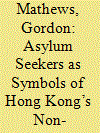

|
|
|
|
|
| Summary/Abstract |
This article discusses the situation of asylum seekers in Hong Kong and how it has changed in recent years. Hong Kong treats asylum seekers relatively well compared to some other societies, but at the same time, the chance of being accepted as a refugee is virtually zero. Although it is illegal for asylum seekers to work, it is virtually impossible for them not to work given the miniscule government support they receive. Amidst government neglect, asylum seekers have emerged as heroes among some Hong Kong young people after the Umbrella Movement. Whereas in years past, asylum seekers were generally ignored or looked down upon by Hongkongers, among some youth today, asylum seekers have emerged as symbols of Hong Kong’s non-Chineseness.
|
|
|
|
|
|
|
|
|
|
|
|
|
|
|
|
| 12 |
ID:
125827
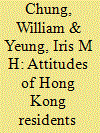

|
|
|
|
|
| Publication |
2013.
|
| Summary/Abstract |
A survey was conducted to study the attitudes of Hong Kong residents toward the safety of operations of the nuclear power plant in Daya Bay and their possible actions in case of leakage. Only 34.5% of the respondents were confident about the operational safety of the nuclear power plant, whereas 23% stated they would immediately leave Hong Kong when leakage occurs. Chi-square tests and multinomial logit analysis indicate that the degree of confidence is significantly related to the perceived ability of the Hong Kong (HK) government and the nuclear power plant company, China Light and Power Co. Ltd. (CLP), knowledge of emergency plan and responsibility, gender, and age. However, the degree of confidence is not significantly related to the distance of the residential area from the nuclear power plant. In addition, the higher the perceived ability of the HK Government and CLP to handle nuclear leakage, the greater the degree of confidence becomes. The chi-square tests suggest that higher perceived ability of the HK Government and CLP are also significantly associated with less likelihood of residents immediately leaving Hong Kong in case of leakage. Hence, the HK Government and CLP are recommended to improve their perceived ability for safety and social stability.
|
|
|
|
|
|
|
|
|
|
|
|
|
|
|
|
| 13 |
ID:
166093
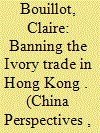

|
|
|
|
|
| Summary/Abstract |
The date of 31 January 2018 marked the adoption in Hong Kong of a three-phased law banning trading in elephant ivory that will come into full effect on 31 December 2021. This follows the decision of mainland China outlawing this practice from 31 December 2017. These new ordinances, which derive from an international convention (CITES), are particularly adapted to these places as they represent (with Japan) the world’s principal destination of ivory, both legal and illegal, and have done so since the 1950s. This trade, and especially its illegal strand, threatens the survival of Africa’s elephants, whose ivory is regarded as precious. In Hong Kong, the movement of ivory is regularly in the news. July 2017 recorded the largest seizure of illegal ivory in the past 30 years (7.2tonnes). Early 2018 was also noteworthy on account of two events: on the one hand, the resignation of a member of the governmental consultative committee on endangered species (who is also an ivory trader), who had been selling illegal ivory, thus lending a whiff a scandal to the legislative process; and on the other hand, the killing in Nairobi of Esmond Bradley Martin, one of the leading experts on the trafficking of ivory. These national and international events, together with scientific studies and various other reports, have been part of the context of legislative reform in Hong Kong. They are an indication of the complex nature of the issues involved, as can be seen in the stormy legislative debates brought about by competing interests. Quite a number of local newspaper articles (in English and Chinese alike), as well as the (English-language) press in mainland China,have covered this reform by exposing the tensions, divergent points of view, and arguments of the protagonists. It might still appear, however, that there has been little discussion of certain points. The present article will highlight, through an analysis of the media’s treatment of the legislative reform process in Hong Kong, the political issues at stake in this ban, and in particular the grey areas of the public debate. It tries to break with the dichotomy “for” or “against” that are often typical of debates on the extinction of these emblematic mammals. In this press review I undertake a detailed analysis of local newspaper articles, essentially those of the English-language press. Of the 41 articles examined, I selected 21 on the basis of their relevance to legislative reform in Hong Kong and the diversity of their content. Two articles from the Chinese-language local press (selected from 28 articles), as well as six articles from the mainland’s English-language press (selected from 47 articles) serve to underscore this analysis. These articles were published between 2015 and July 2018, that is, from the announcement of the reform until its initial implementation. This article will refer to the timeline of the reform with respect to several key moments and questions that require particular attention.
|
|
|
|
|
|
|
|
|
|
|
|
|
|
|
|
| 14 |
ID:
166095
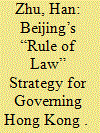

|
|
|
|
|
| Summary/Abstract |
This paper examines the evolution of legal strategies that the central government has used in managing Hong Kong affairs in the past three decades. It demonstrates that the Beijing government appears to have successfully employed the tactic of “legalisation without democratisation” to neutralise political resistance, to resolve thorny issues, and to stifle pro-independence voices. However, as Beijing’s legal strategies for Hong Kong have become more hands-on and assertive, the flaws and instrumentalism of Chinese-style “rule of law” have become increasingly salient, giving rise to deepening conflicts with the Hong Kong common law system. Legalisation without democratisation has given rise to a worrying trend of rising authoritarian legalism in Hong Kong.
|
|
|
|
|
|
|
|
|
|
|
|
|
|
|
|
| 15 |
ID:
113772
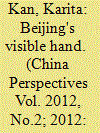

|
|
|
| 16 |
ID:
137519
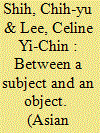

|
|
|
|
|
| Summary/Abstract |
Late Pao-kun Kuo in Singapore and contemporary Denny Yung in Hong Kong have made articular ontological and epistemological choices in their experimental theater in the context of the de-colonization and rise of China. We gather, between the two sites, a possible dichotomy in the representation of China: China as a collective subject to accommodate the changing world and China as an individualized object that emerges in each narrator’s chosen perspective. Kuo intends to prompt the audience to reconnect with something greater than their individuality. For Kuo, the crisis is the loss of cultural subjectivity and the privileging of transcendence over individualized meanings of life. For Yung, cultural subjectivity is no longer a question after the return of Hong Kong to China. Yung painstakingly generates the legitimacy and capacity of individual Hong Kong people to have faith in their own ways of transcending any version of the entirety of China
|
|
|
|
|
|
|
|
|
|
|
|
|
|
|
|
| 17 |
ID:
187860
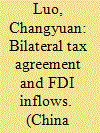

|
|
|
|
|
| Summary/Abstract |
This paper explains the changes in the composition of the source countries or regions of FDI in China from the perspective of taxation. Based on FDI data from 2003 to 2012, the empirical test, employing the difference-in-differences (DID) model, shows that, after the implementation of the tax agreement between the mainland and Hong Kong in 2007, FDI from Hong Kong increased significantly. After the integration of domestic and foreign-funded enterprise income tax systems in 2008, Hong Kong capital inflows increased even more drastically. The extended analyses show that, the substantial increase in Hong Kong capital after the implementation of this bilateral tax agreement was partly related to the diversion effect of investment. MNCs might have diverted investment from other tax havens to the mainland via Hong Kong, resulting in a sharp increase in the amount and proportion of Hong Kong investment, whereas those of FDI from other tax havens have declined.
|
|
|
|
|
|
|
|
|
|
|
|
|
|
|
|
| 18 |
ID:
072620
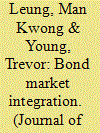

|
|
|
|
|
| Publication |
2006.
|
| Summary/Abstract |
This paper seeks to examine the integration of the evolving bond markets in the Chinese Mainland (CM) and Hong Kong (HK). To tap the international pool of capital, the CM government and CM enterprises have issued foreign currency bonds in HK and other developed markets. Since 1998 offshore CM bonds offered to the public have not been denominated in HK dollars probably because of concerns over the stability of HK's linked exchange rate and the differential credit ratings of the two economies. Even though HK has become increasingly well equipped to handle the clearing, settlement and custody of local and foreign currency bonds across its borders, it needs to continue to lobby for and attract CM government and corporate issues of foreign currency bonds (and Rmb bonds, if this were to be permitted) if it is to establish itself as a regional bond centre in Asia.
|
|
|
|
|
|
|
|
|
|
|
|
|
|
|
|
| 19 |
ID:
179015
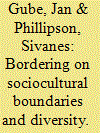

|
|
|
|
|
| Summary/Abstract |
This article illustrates the interface of ethnic identities and a multi-ethnic learning environment in a predominantly Chinese society. Hong Kong – whilst reputed as an Asian international city – has displayed reticence in promoting multicultural initiatives and inclusiveness at a policy level. In this context, this study draws on a sociocultural perspective and interviews with a group of ethnic minority Filipino secondary school students. The interview data point to juxtapositions of ethnic identities with reference to students’ interactions with peers from same and different ethnic groups, ethnic in-group practices, and a schooling discourse that reflects Chinese language expectations and recognition of cultural diversity. The analysis, as a result, specifies how schooling experiences in this case become grounds for identity tensions in being a Filipino and a Hong Kong person. These tensions caution against tacit sociocultural relations in learning environments resulting from school-initiated multicultural practices without broader and explicit policy support for culturally diverse student population.
|
|
|
|
|
|
|
|
|
|
|
|
|
|
|
|
| 20 |
ID:
131784
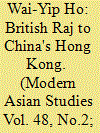

|
|
|
|
|
| Publication |
2014.
|
| Summary/Abstract |
The madrasa, the Islamic institution of learning, has for centuries occupied a central role in the transmission of religious knowledge and the shaping of the identity of the global Muslim community (umma). This paper explores the sharp rise in the number of madrasas in contemporary Hong Kong. It examines, in particular, how South Asian Muslim youth, after receiving a modern education in a conventional day school, remain faithful to their religious tradition by spending their evenings at a madrasa studying and memorizing the Qur'an. Engaging with the stereotypical bias of Islamophobia and national security concerns regarding the ties of madrasas to Islamic terrorist movements over the last decade, this paper argues that the burgeoning South Asian madrasa networks have to be understood in the context of Hong Kong's tripartite Islamic traditions-South Asian Muslim, Chinese Hui Muslims, and Indonesian Muslims-and within each Muslim community's unique expression of Islamic piety. Furthermore, the paper also identifies factors contributing to the increase in madrasas in Hong Kong after the transition from British colonial rule to China's resumption of sovereign power in 1997.
|
|
|
|
|
|
|
|
|
|
|
|
|
|
|
|
|
|
|
|
|